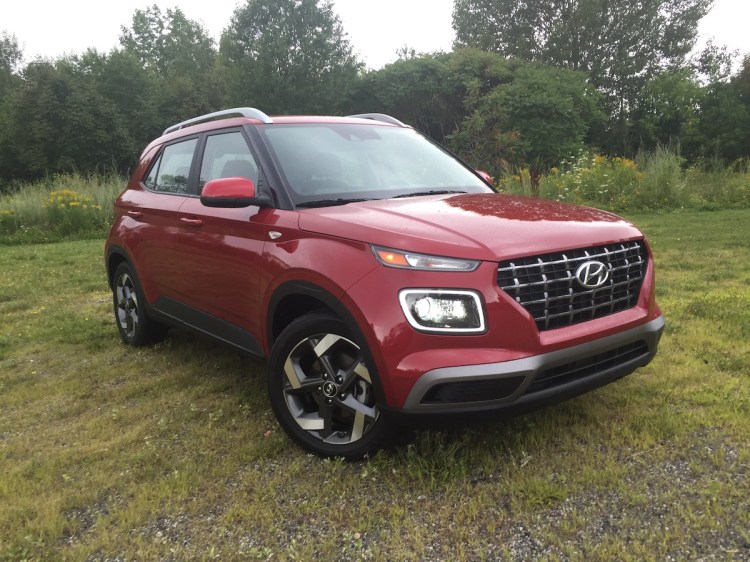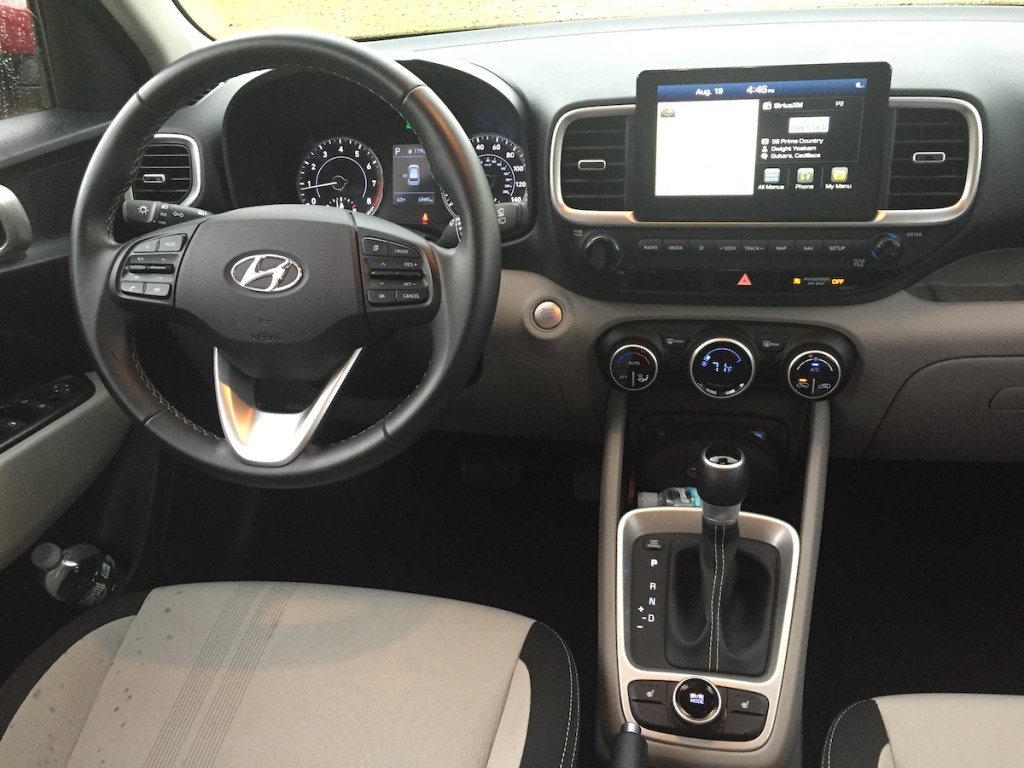This review was written in August 2020.
At 159-inches long, Hyundai’s newest crossover offering is shorter than any car in the brand’s lineup, shorter than the Kia Soul, Nissan Kicks, Ford EcoSport, Honda HR-V, or Fiat’s 500L, and just barely longer than a MINI Cooper.
But inside is where the sub-compact class Venue packs a punch that will give entry-level and value-conscious shoppers an edge that other rivals lack, because there is big value here with pricing starting at a modest $17,350.
And while we might argue over the front fascia design of the Venue—and how it lacks some of the forward grace of other recent Hyundai products—the front wheel drive only Venue will most definitely appeal to any driver who spends a lot of time in tight, urban driving environments. With a miniscule turning radius, quick, adroit handling, plus the exterior dimensions to fit in the smallest of parking spaces, the Venue has to be on your shopping list if you’re a city dweller.
Available in three trim levels—SE, SEL (tested) and Denim, which is outfitted as imagined with a denim-themed interior and denim exterior paint—the Venue comes with a 1.6-liter naturally aspirated four-cylinder making 121-hp. A CVT automatic is now the only transmission, while EPA estimates are 30/34/32-mpg.
Aiding the design is a lightweight body—barely 2,600-pounds before options, that features easier ingress and egress than any compact car, plus the added visibility provided by the higher hip point found with crossovers. The seat lacks lumbar adjustments, and it could benefit from a larger range of height adjustability, yet SEL trim brings heating elements along with one-touch front windows, rear camera, forward collision avoidance system, lane-keeping assist, driver attention warning, 4-speaker audio, selectable drive modes, USB jacks, split-folding rear seat back, and multiple media jacks for $19,250.
Premium Package gets you the heated cloth seats, LED lites front and rear, 17-inch tires and wheels, proximity key access and starting. The upsized touchscreen ($1,120) adds navigation, Sirius/XM, Apple/Android, and Hyundai’s Blue-Link connectivity system, while the driving aid package ($1,750) brings blind-spot detection, rear cross-traffic alerts, leather wheel and shifter coverings, plus a power sunroof.
Key to the interior is the straightforward convenience and simplicity of the whole layout. Controls are efficient—you don’t need two nights with the owners’ manual to select media functions, or, climate selections. Simple always works best—especially when piloting a fast-moving car in a stressful situation. Why automakers find it necessary to increase the complexity of operating a motor vehicle, especially given the distractions that too many drivers already allow inside the vehicle with them, is fraught with too many hazards.
The 1.6-liter engine does a good job. It provided all of the power necessary, while remaining efficient at the pump. No one will confuse it with its 1.6-liter Turbo sibling, yet those drivers aren’t looking at a Venue anyway, so Hyundai chose the prudent path of economy, reliability, and stable operation.
More and more small car nameplates are being dropped from automaker’s lineups. Honda’s once popular Fit, as small as the Venue, is now gone. Toyota is axing several smaller products, while Chevy is losing the Sonic, its competent sub-compact sedan that led the segment in sales just a few years ago.
It is products like this Venue, the Nissan Kicks, and the Chevy Trax and Buick Encore that are rapidly displacing small cars. Automakers cannot afford to build small cars, no matter how efficient they are, if no one buys them. Add looming government mandates and regulations that are forcing automakers to build expensive electric vehicles that have a very uncertain acceptance level—in all markets, and we will assuredly witness more transition in the marketplace.
While Hyundai is preparing more hybrid and electric offerings (as well as hydrogen powered models) like its highly-rated Kona (longer in length, but shorter in height than the Venue), some automakers like Toyota are working to hybrid-ize their entire fleet—in effect hedging their bet on what technology works best in the marketplace, while meeting the spirit of the regulations.
Given the ever-expanding consumer relationship with crossovers, watch to see how Hyundai powers future Venue’s if sales spike. It’s a great alternative to the small car, delivering space, efficient transportation, and spritely handling in a package that should have mass appeal.
Send questions/comments to the editors.





Comments are no longer available on this story